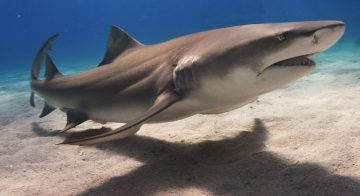For MSc candidate Madeline Cashion, sharks have always been a part of her life. “When I was very young my mother would make me write poems and I wrote them about sharks. I think I was fascinated by how powerful they are. Somewhere at home I have a book of those poems, shark facts that I collected, and collages I made as a child.” That would not be surprising for a child growing up near the ocean, but as Madeline puts it, “growing up in land-locked Calgary, it was a bit odd.”
With her interest firmly fixed on the oceans, Madeline began her academic career with an undergraduate degree at Dalhousie University, before coming to the University of British Columbia to work with renowned marine scientist, Dr. Daniel Pauly, and the Sea Around Us project.
She studies shark fishing; primarily how many are fished, what species are caught, what fishing gear type is used to catch them, and what does this mean for shark populations. “They are fished widely internationally, but not much is known about the catch. We need to know because about a quarter of the class of fish that includes sharks are threatened with extinction. They are very important for marine ecosystems, so we need to be sure we understand what is happening with their exploitation.”

Lemon Shark. Photo: Albert Kok/Flickr
She acknowledges that as a top predator sharks are feared, but points out that in a given year only a handful of people may die from shark attacks, while in the same period, humans kill approximately 63-273 million sharks (2013 figures). “Which is worrying because they are an integral part of the marine ecosystem. As a top predator, if they are caught then you are reducing the control on the species below. For ecosystems, such as coral reefs, this means that reef health is affected. They become less and less resilient, unable to adapt to climate change, or deal with invasive species, (such as lionfish in the Caribbean).”

Madeline enjoys her research on sharks, and hopes that more women become involved in the sciences. “UN figures say that only about 20% of researchers in science are women. That is very small; too small. We need to encourage them to stay focused on the sciences at a young age.” She points to her experience volunteering at the Vancouver Aquarium. “When I am at the Aquarium we teach kids about marine biology and conservation. The curriculum program we have there is science-focused, but also very accessible. And at young ages you don’t see any differences. They all soak it up. Girls are just as interested as boys. We need to encourage any interest a child has,” she concludes.
Madeline is happy to share one of the shark facts that fascinated her as a child. “Sharks are older than trees,” she says with excitement. “Sharks have been on this Earth longer than trees have. They’ve had so much time to evolve, and it is why there are such crazy forms of sharks; some eat plankton like the basking shark, and some are top predators like tiger sharks and white sharks.
“I think it is that diversity, and how key they are for the ecosystems, that drives me to study them.”
Find other stories about: sharks, Madeline Cashion, IOF students